The Magic of Living in Cairo: City of Paradoxes
Article and photos by Naira Bonilla
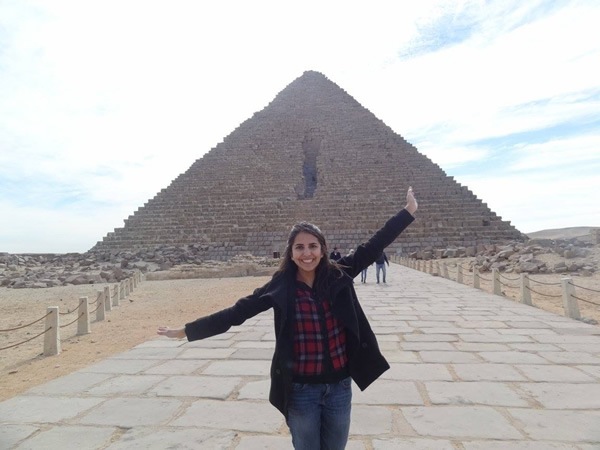 |
| The author in front of a pyramid in Giza, very near Cairo. |
Finding a new place took me three very long weeks. As I went through the countless, very diverse options, I learned a lot about Egyptian culture. Two things that I quickly found out reflect how conservative Egyptian society can be: visitors and bawaab.
When I started searching for apartments, I quickly noticed that *visitors allowed* was a common theme. It turned out that if you rent a room and have access to the whole apartment you can indeed have visitors. The catch is that in many cases, proprietors don’t want Egyptian male visitors visiting (if you are a woman, that is). Why? Because it's socially frowned upon to entertain male guests without supervision. Even if the proprietor doesn't personally care, you still need to have the bawaab’s permission.
A Bawaab is similar to a doorman. He usually lives on the first floor of the building, delivers the mail, takes out the trash, and is the most powerful person in the building. He is the keeper of morals and provides safety, so if he's conservative be careful! He can forbid visitors to come in, make a scene, threaten to call the police (even though they won’t get involved), stop delivering your mail, etc. It’s better to have him on your good side.
I eventually moved to a great place in the Maadi neighborhood with great roommates and no bawaab.
Navigating Cairo
The first days in any new city are usually difficult, with new routines, unknown sounds, smells, and a completely new way of seeing life. Cairo has a "figure it out yourself" feel. The city is absent of almost any signs, danger warnings, or "mind the gaps" signage. You need to be at full attention when walking around Cairo. It's common to see a huge hole in the middle of the sidewalk, with people just casually jumping across — that is if there is even a sidewalk. Cars will usually park anywhere on the street, including a semi-destroyed sidewalk, leaving pedestrians at the mercy of drivers. Traffic lights are rare, so crossing the street can be a high-risk adventure.
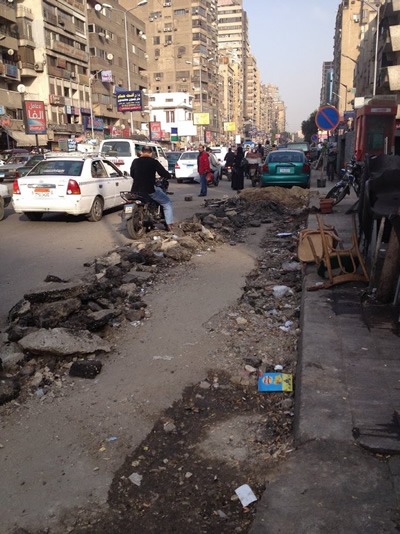 |
| Keeping it real: The author's walk to work in the Dokki neighborhood of Cairo. |
Modes of Transportation Range from Microbuses, Buses, Taxis, Metro, and Uber
-
Microbuses and buses: You have to be very skilled to take advantage of this mode of transportation. There are no signs, so you have to make hand gestures to signal where you are going (e.g. a triangle for the pyramids). Alternately, you can ask the locals, but you usually need to speak Arabic. I took microbuses a few times but knew the route, and it was never more than a 15-minute drive. I still had to haggle using my basic Arabic, largely just "La, la, la" ("No, no, no"), while repeating numbers until I negotiated a reasonable price for the ride. Haggling is an essential life skill in Cairo and you can — it is almost a ritual — haggle for just about anything.
-
Taxis: There are white and black and white taxis. Always take the white ones since they have taximeters. However, sometimes they will be broken. So if you can, ask someone the normal price. Also, not many taxi drivers speak English, so I always had an Egyptian friend speak to the driver over the phone since they didn’t understand my Arabic pronunciation.
-
Metro: The metro is very crowded during peak hours, signs are mostly in Arabic, but it's straightforward to understand, so if you know where you are going you won't get lost. Also, there are cars for women only. If you are standing next to the door people will always ask if you are getting out so everyone can move accordingly, which makes the passenger exchange at the stations a very smooth process.
-
Uber: Use it! There’s also an Egyptian version is called Careem.
|
Relaxation and Culture in Cairo
Not everything in daily life is stressful in Cairo. Walking around the Nile can be incredibly peaceful. There are some secret spots, absent from any noise, no sounds of honking, and no yelling. The Zamalek and Maadi neighborhoods offer many such places. One of my favorite neighborhood spots is El Sawy Culturewheel, where there are concerts and events at night, and during the day you can just go and chill out by the Nile. Both of these neighborhoods offer multiple libraries (like Diwan), with cafés where you can sit, read, and think.
One of my favorite relaxing activities is taking a Felouka (sailboat) on the Nile, where you glide down the river for an hour or two, hearing little of the city chaos — just the sounds of your friends and the city in the distant background.
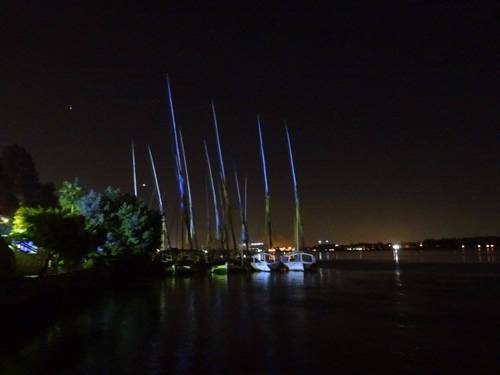 |
| You can always sail down the Nile in a Felouka (sailboat) and relax floating on the calm waters. |
You can also explore Old Cairo and check out the Oud musical concerts, or the spectacular Tanoura dancing shows that take place in El Ghouri Complex on Mondays, Wednesdays, and Saturdays.
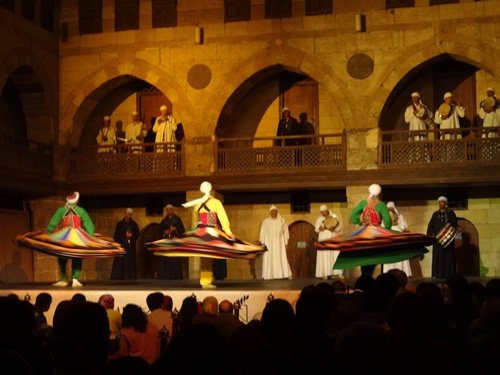 |
| A Tanoura dancing show. |
Job Hunting in Cairo
I had just finished a Master's Degree in Environment and Development. However, the environmental sector is not yet well-developed in the Egyptian economy, so I turned to teaching English. A friend recommended me to her language center, and I started teaching within a week of my arrival. Luckily, I was able to quickly adapt and did my best to become an excellent teacher.
Some language schools require an exam and an interview, some will ask for certificates, but plenty do not ask for any qualifications other than the ability to speak English. Teaching English is a popular option for foreigners trying to figure out what they wish to do in life, though others find great enjoyment in teaching and have a desire to work in the field longer-term. If you teach at a language center in Cairo, the teaching conditions are not always the best since you will have to work very late hours (as everyone takes classes after work), and you only have one day off. But I would teach again and encourage anyone to do so. You can experience Egypt from the perspective of your students, and gain a deeper sense of immersion in Egyptian life and culture. For example, we would spend most of the class talking about politics, marriage, social norms, science, freedom, and many related subjects.
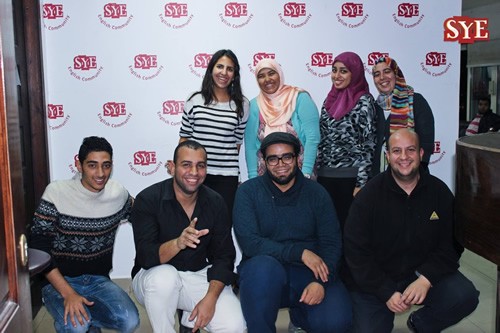 |
| The author's English language students. |
Bureaucracy and Visas in Egypt
Egypt’s communist legacy means the government had to provide jobs to everyone and public officials can never be fired, so you can imagine the long processes and slow pace of work when in a government building.
Fortunately, the only time you will set foot in a government building will be at Mogamma, where you must do your visa procedures. Everyone enters Egypt with a tourist visa that you can keep renewing indefinitely without leaving the country. More informal jobs, such as teaching English in Egypt, will accept this visa.
To renew your visa, you need to go to Mogamma with a picture, copy of your passport and visa, make your way up the crowded corridor where people tend to shout, wait for hours, find a lady that sells stamps, get a form, fill it out, and attach your stamps. Then you must wait in another line to give your form to another government official, likely drowning in paperwork, and then come back the next day for your passport. At least you are not alone in the picture among a sea of foreigners waiting to get their new visa, and it is well worth the time in the long term. |
Life, Language, and Dealing with Hard Times
One of my favorite experiences while in Egypt, what I miss the most, was immersion in a completely different language. Just hearing Arabic sounds and not understanding what they meant made me more aware of the communication challenges I was facing every day.
A Very Basic Practical Arabic Lesson
- Alhamdulillah ("Thank God.") The most popular word in Arabic.
- Insha'Allah: ("God willing.") The second most popular word in Arabic. Here are some examples of its usage:
Will we meet tomorrow? Insha'Allah
Will you come to my party? Insha'Allah
The food will arrive in 15 minutes. Insha'Allah!
(At a work interview), Insha'Allah, we will call you tomorrow...
The prominence of these words in Arabic creates a completely different pace of life — slow, informal, and relaxed, since if God didn't "will" it, well Ma3lesh (sorry)!
Mesh Moshkela ("No problem.")
Many people in Egypt text using Latin letters instead of the Arabic alphabet, so numbers come to replace letters that don’t exist in the Latin alphabet:
Here are some examples of the hybrid texting language:
- 3 is short for the letter is "ayn." The pronunciation is like a very nasal A and almost impossible for those new to Arabic to reproduce.
- 5 is a hard H
- 2 half an A
- 5alas is short for "Stop it"!
- Ya3ni is a filler word similar to I mean or like
- Aiwa means "Yes."
- La2 means "No."
- Mashy means "Ok."
|
Cairo: Where Something is Always Happening
Cairo is a city where something, good or bad, is always happening.
For example:
- the metro breaks down
- the pipes in my house explode
- my phone drowns in water
- the internet goes down
- a family of cats attacks me on my way to work
The list of the unexpected seemed endless. In addition, I had to go about preparing classes, adapting to a different culture, making personal relationships work, trying to learn a new language, and thinking about what I was going to do with my life because (I thought) I couldn’t teach English forever. I had to push back constantly and remind myself that I was going to make it under any circumstances. In sum, being calm, patient, willful, and focused are all essential life skills in Cairo.
People made it possible for me to handle the chaos. My boyfriend and his friends were a welcoming and loving group. Everyone was willing to help me, translate for me, teach me new words, take me to the beach, offer advice, and be there during difficult moments. Also, people on the street are extremely helpful if you stop and ask (even in English). I constantly found myself laughing with strangers (or being the source of laughter for my attempts at speaking Arabic), received small gifts from the store clerk where I bought my water every morning, and was even offered private visits at tourist spots. All this with while grasping only very basic Arabic.
Safety
Contrary to popular belief Egypt is not dangerous. I come from Colombia, until recently one of the most dangerous countries in the world, so I know danger and in my experience Egypt did not merit that description. I never once felt frightened walking alone at night on the street, nor was I a victim of extreme harassment, pick pocketing, or any type of con. Of course, like everywhere, you have to be careful and aware of your surroundings, but Cairo is far from being a dangerous city.
Religion
Egypt is one of the most liberal Muslim countries in the region. You can see a family at the beach where the grandma is wearing a black hijab and long black cloak, the mother is wearing a colorful hijab and jeans, while the granddaughter is wearing a bikini. The country is tolerant of diversity, and no one expects foreigners to wear a veil, pray, or follow Muslim traditions. I would recommend, however, always covering your shoulders and legs in Cairo and Alexandria to avoid unnecessary attention, especially if you are riding public transport, but in other cities you can dress however you wish.
Egypt: I Miss you Every Day
In Egypt, I discovered what I did not even realize I was seeking. Many times, I felt small and helpless but pushed back on the intensity of Cairo. I conquered tall buildings, insufferable traffic, endless crowds, and created personal space in the city.
I had to
leave the city eventually, but I miss it every day. I miss being in a foreign land, feeling lost and even scared, figuring out how to handle problems, and knowing that at the end of the day there will always be a way to adapt. Once you have moved abroad you will likely learn to love wherever you decide to live, though living in Cairo is my particular experience and frame of reference.
What I miss most of all about living abroad is feeling that I can connect deeply with people who have such different backgrounds, that I can laugh and joke about the same movies and books, listen to the same music, have the same goals, and in my case survive Cairo (or perhaps anywhere) together.
Living abroad is more than traveling, it's about immersing yourself in a new culture, its people, its lands, more deeply. You learn and come to see how the experience changes you. Nothing will teach you more than facing up to something you thought you couldn't and coming through on the other side. Egypt offered me so much happiness, love, hospitality, stress, and even tears. I’m so grateful for every experience, every person encountered, and every memory that remains.
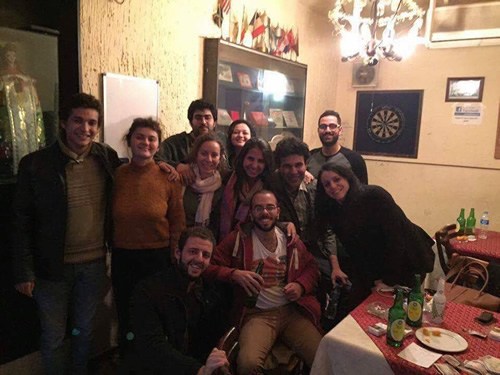 |
| I miss my people in Cairo... |
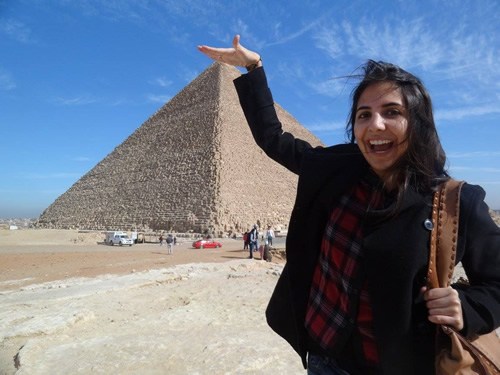 |
| ...but the author's memories remain. |
Please listen to the musical inspiration for this story.
Naira Bonilla has an M.A. in Environment, Development and Policy. She is a traveler and writer who is passionate about environmental causes. She is also a diver and unofficial tourism promoter (for Egypt). Her goal is to live abroad in at least 10 more countries (visit many more) and fall in love with all of them.
|
